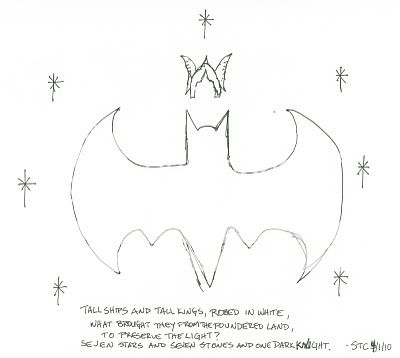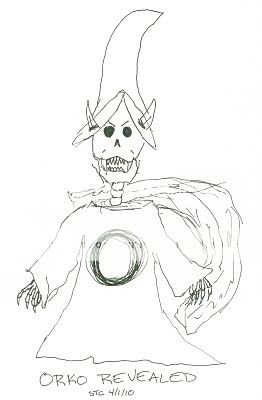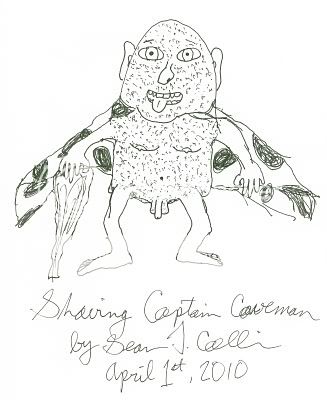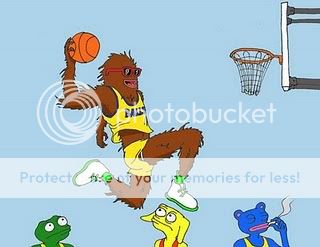* Douglas Wolk was not nuts about Blackest Night #8. He argues that by reviving various old dead superheroes and supervillains, the series undermines both the DC Universe’s unique “legacy” aspect, by which the mantle of different superbeings is worn by different characters over time, and the dramatic impact of their original deaths. I disagree with all this for a few reasons. (Spoilers ahoy…)
For one thing, very very very few of these characters’ deaths were all that dramatic to begin with. I’ll grant you Martian Manhunter and Osiris, even Maxwell Lord and the Hawks (even though their deaths were pretty icky). But the rest? Aquaman had been turned into Squidbeard the Grey or something when he bought it, Firestorm and Jade and Captain Boomerang were run-of-the-mill sacrificial lambs to juice up an event comic (which frankly was the case with MM and the Hawks too), and the Reverse Flash and Hawk died so long ago I forget how it happened. Gwen Stacy they ain’t. Plus, nearly all the characters who’ve been revived during the last year or so, including everyone in Blackest Night except the Reverse Flash and Hawk, were killed by the same editorial regime that ended up bringing them back. It’s not like some storied classic run was undone by any of this.
Meanwhile, legacies are hardly relevant with many of these characters: There are no younger versions of Martian Manhunter, Aquaman, Hawkman, Hawkgirl, Deadman, Maxwell Lord, Osiris, or Jade for the old versions to replace, while it appears the new and old Firestorms will be combined, and Professor Zoom had already been resurrected to interact with his successor Zoom several months ago. And frankly, God help you care passionately enough about the new Captain Boomerang or the new Hawk to complain that they’ll no longer have the spotlight to themselves.
Which leads me to my core contention, which is that the legacy aspect of the DCU is perhaps the single most overrated concept in superhero comics, not least by the company itself. It reminds me of Jerry Seinfeld’s routine about how sports fans are really just rooting for laundry: Is it really all that exciting to anyone that this or that outfit has been given to some new clown? With the possible exceptions of the various Robin characters and the new Blue Beetle–who can’t maintain a title in today’s market, for whatever that’s worth–has there even been a legacy character worth his or her salt since the Silver Age reinventions of the Flash and Green Lantern anyway? Douglas says this keeps things feeling fresh, like the world moves on, but if you’ve ever read any DC comic dealing with the legacy concept–Justice Society of America is about legacies almost exclusively–you’ll know they’re about anything but keeping things fresh and forward-looking. They’re the most nostalgia-obsessed, most past-fixated comics in their entire stable. As Douglas himself says, in reality “legacies” are about copyright service as much as anything else. So why not bring back the classic dudes and dudettes if you’ve got the chance?
* If you followed all the stuff I wrote about Siege‘s sales levels on Robot 6, you might wanna check out Joe Quesada’s take on the topic in this Robot 6 interview with Kiel Phegley. One angle he introduces that I find interesting is that the company has a variety of smaller but still high-profile series and mini-events going on that perhaps diverted some sales away from the main event. I’m not sure how convinced I am, but it is true that over at DC you’re really only talking about Blackest Night and Batman and Robin.
* Chris Evans is Captain America. Sure, why not.
* Here are Whitney Matheson’s weekly Lost comment-thread catches. There’s a tidbit from a recent producers podcast that struck me.
* Here’s what’s in that extended Nightbreed workprint. Qualified enthusiasm seems to be the order of the day.
* Recently on Robot 6: Rich Koslowski does the Three Little Pigs.
* We Are the LAW is really cookin’ lately. I drew Orko Revealed, Batman of Gondor, and Shaving Captain Caveman, while I really dig my pal Zach Oat’s Boy’s Club/Teen Wolf tribute. Click the links for the big versions!





4 Responses to Carnival of souls: Special “no love for legacies” edition